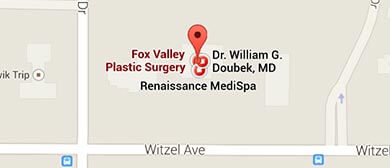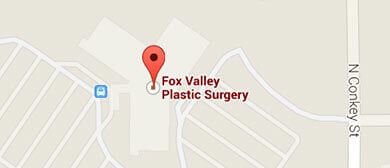Call Us: (920) 233-1540
Breast Implant Illness FAQ
This information is from the American Society for Aesthetic Plastic Surgery.
Q: What is Breast Implant Illness (BII)?
A: There are women with breast implants who self-identify and present with various systemic symptoms and believe that these are related to their breast implants. They refer to these symptoms as Breast Implant Illness (BII).
Breast Implant Illness (BII) is a term used by women who have breast implants and who self-identify and describe a variety of symptoms including (but not limited to) fatigue, chest pain, hair loss, headaches, chills, photosensitivity, chronic pain, rash, body odor, anxiety, brain fog, sleep disturbance, depression, neurologic issues and hormonal issues that they feel are directly connected to their saline or silicone, textured or smooth breast implants.
The recent increase in patients reporting Breast Implant Illness (BII) symptoms appears to be related to social media. There is one Facebook group alone with more than 70,000 members, all of whom report Breast Implant Illness (BII) symptoms. This is not to say that social media is the cause of Breast Implant Illness (BII) however, it may account for the rapid increases in patient reporting. BII is not an official medical diagnosis.
Q: Is there a link between medical grade silicone implants and any disease?
A: Silicone is an element that exists in nature as crystalline silica, which has been shown to activate the immune system in conditions such as systemic sclerosis which has been seen in stone masons. Silicone used in breast implants is different and to date has not been proven to cause any disease. This silicone does not exist is nature, it is created by hydroxylating silica to form polydimethylsiloxane. Medical grade silicone has had antioxidants, dyes, and plasticizers removed during processing.
Q: Are there any tests that would indicate a connection between breast implants and symptoms that are being labelled Breast Implant Illness (BII)?
A: Although there is no diagnostic testing specifically for Breast Implant Illness (BII), there are tests for autoimmune diseases that can be performed to evaluate for potential causes of a patient’s symptoms. There are patients who have symptoms they attribute to Breast Implant Illness (BII) with positive immune testing and others with all laboratory tests which show no abnormalities.
Q. Is there any scientific data showing causation between implants and these symptoms or any disease entity?
A: In 1999, The Institute of Medicine Committee on the Safety of Silicone conducted an extensive review of the available literature and concluded there was no demonstrated clear link between silicone implants and any systemic illness. There have been studies of many different sizes and design to look at the safety of breast implants themselves. These have looked at specific autoimmune disorders and diseases. In aggregate, these studies show little to no links between breast implants and any disease. Studies of patients who have symptoms that they have related to their breast implants have not shown consistent laboratory abnormalities to define a distinct syndrome. To-date, there has been very little in the way of research into this entity that has been labelled Breast Implant Illness (BII) by women with breast implants.
Q: What is the risk of developing Breast Implant Illness (BII)?
A: As there is no definitive link between the often subjective and divergent list of symptoms, and no means for testing, there is no ‘known’ risk. Many of the symptoms described by breast implant patients are experienced by the general public on a regular basis with or without implants. That isn’t to write-off a potential connection, but no connection has been established to-date.
Patients should however be informed of the risks that can be associated with breast implants, including (but not limited to) BIA-ALCL, a rare spectrum of disorders that can range from a benign accumulation of fluids around the breast (seroma) to an extremely rare lymphoma. They should know that BIA-ALCL is not a cancer of the breast tissue itself and that when caught early, it is readily curable. If the disease is advanced, chemotherapy or radiation may be required.
Q: If after the discussion of risks and the possibility of no improvement of symptoms post-explantation is discussed with a patient, what should be done if the patient demands an “en bloc” or “total” capsulectomy with their explantation?
A: There are many medical inaccuracies perpetuated by the internet. BII patients tend to believe that a total capsulectomy is necessary to remove all causative agents and they prefer it en bloc, oftentimes without having a full understanding of what size incision is necessary for en bloc. With explantation, it is not always possible to remove all of the capsule. Sometimes a portion of the capsule must be left behind or is disintegrated with the use of electrocautery to prevent significant damage to muscle, rib or lung. Patients who had an axillary approach or periareolar approach for breast implant placement, cannot have the procedure done through those incisions. There are increased surgical risks associated with en bloc capsulectomy which requires a complete dissection of all the tissues surrounding the breast implant and, that we do not have enough collective data to guarantee any improvement in their symptoms they have labelled Breast Implant Illness (BII).
Contact Fox Valley Plastic Surgery at (920) 233-1540 or request your consultation online. The decision to remove or replace implants is not always clear cut. We have helped patients from Green Bay, Sheboygan, Appleton, Neenah, Oshkosh, Fond du Lac, and West Bend determine the best course of action regarding Breast Implant Illness. Our board certified Wisconsin plastic surgeons are helping women from all over the upper Midwest to perfect their personal Renaissance. Request your consultation today.


Oshkosh, WI (920) 233-1540